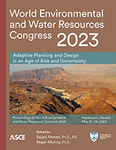What’s Next in Water Distribution Systems Management?
Publication: World Environmental and Water Resources Congress 2023
ABSTRACT
Water distribution systems (WDSs) were studied intensively in the last decades. The research concerning WDS is varied and covers many aspects of the WDS lifecycle such as design, operation, water quality, sensor placement, leak detection, demand forecasting, and more. A common approach in all areas of research on WDSs is to explore within predefined boundaries of the problem and partially represent anything beyond these boundaries. For example, consumers that consume water from the network and use it, a direct outcome of this action is that the sewage collection system gets its input. The two systems are inherently related to each other but analyzed and operated separately. More examples of such boundaries are the connection between WDSs and electricity grids, where electrical prices are usually treated as inputs to WDS problems, but the costs of electricity production and transmission are not considered. Moreover, WDS storage tanks can be used for regulating loads in the electricity grid. Another example is the state (volume, levels, and quality) of water sources such as aquifers and surface waters. These are usually studied from a hydrological perspective, but WDSs and natural water resources are subject to mutual interconnections. These examples (and others) point out that WDSs are not isolated systems; they are integrated with other natural and infrastructure systems. Accordingly, the decision making related to the different aspects of WDSs should consider the full complexity that exists in real systems, which is broader than the WDS itself. This study elaborates on several opportunities to expand the existing boundaries of WDS problems, thus opening new research areas in WDS management.
Get full access to this article
View all available purchase options and get full access to this chapter.
REFERENCES
Denig-Chakroff, D. (2008). Reducing Electricity Used for Water Production: Questions State Commissions Should Ask Regulated Utilities.
Fooladivanda, D., Dominguez-Garcia, A. D., and Sauer, P. W. (2019). Utilization of Water Supply Networks for Harvesting Renewable Energy. IEEE Transactions on Control of Network Systems, 6(2), 763–774. https://doi.org/10.1109/TCNS.2018.2873946.
Heberer, T., Reddersen, K., and Mechlinski, A. (2002). From municipal sewage to drinking water: Fate and removal of pharmaceutical residues in the aquatic environment in urban areas. Water Science and Technology, 46(3), 81–88. https://doi.org/10.2166/WST.2002.0060.
Kosowatz, J. (2018). Energy Storage Smooths the Duck Curve. Mechanical Engineering, 140(06), 30–35. https://doi.org/10.1115/1.2018-JUN-1.
Mitchell, V. G., Mein, R. G., and McMahon, T. A. (2001). Modelling the urban water cycle. Environmental Modelling & Software, 16(7), 615–629. https://doi.org/10.1016/S1364-8152(01)00029-9.
Rozos, E., and Makropoulos, C. (2012). Assessing the combined benefits of water recycling technologies by modelling the total urban water cycle. Urban Water Journal, 9(1), 1–10. https://doi.org/10.1080/1573062X.2011.630096.
Sharif, M. N., Haider, H., Farahat, A., Hewage, K., and Sadiq, R. (2019). Water–energy nexus for water distribution systems: A literature review. Environmental Reviews, 27(4), 519–544. https://doi.org/10.1139/ER-2018-0106.
Stuhlmacher, A., and Mathieu, J. L. (2020). Chance-Constrained Water Pumping to Manage Water and Power Demand Uncertainty in Distribution Networks. Proceedings of the IEEE, 108(9), 1640–1655. https://doi.org/10.1109/JPROC.2020.2997520.
Takahashi, S., Koibuchi, H., and Adachi, S. (2017). Water Supply Operation and Scheduling System with Electric Power Demand Response Function. Procedia Engineering, 186, 327–332. https://doi.org/10.1016/J.PROENG.2017.03.257.
Wakeel, M., and Chen, B. (2016). Energy Consumption in Urban Water Cycle. Energy Procedia, 104, 123–128. https://doi.org/10.1016/J.EGYPRO.2016.12.022.
Zamzam, A. S., Dall’Anese, E., Zhao, C., Taylor, J. A., and Sidiropoulos, N. D. (2019). Optimal water-power flow-problem: Formulation and distributed optimal solution. IEEE Transactions on Control of Network Systems, 6(1), 37–47. https://doi.org/10.1109/TCNS.2018.2792699.
Information & Authors
Information
Published In
History
Published online: May 18, 2023
ASCE Technical Topics:
- Domain boundary
- Electric power
- Energy engineering
- Engineering fundamentals
- Environmental engineering
- Equipment and machinery
- Grid systems
- Mathematics
- Storage tanks
- Systems engineering
- Systems management
- Tanks (by type)
- Water and water resources
- Water leakage and water loss
- Water management
- Water quality
- Water supply
- Water supply systems
- Water treatment
Authors
Metrics & Citations
Metrics
Citations
Download citation
If you have the appropriate software installed, you can download article citation data to the citation manager of your choice. Simply select your manager software from the list below and click Download.
